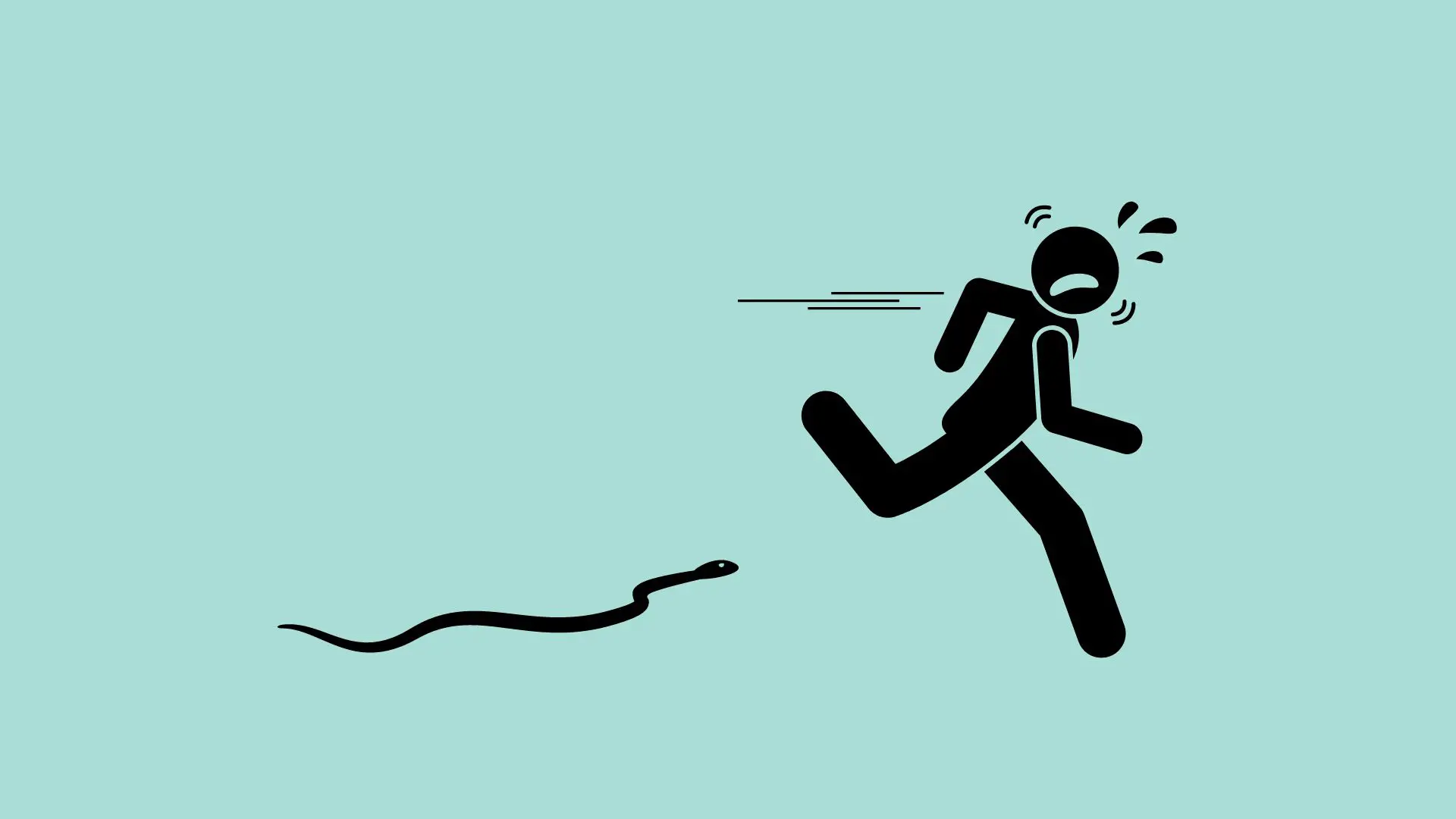The belief that snakes may intentionally follow people to attack them is baseless since there is no way that snakes could do that. The two main reasons snakes usually bite are to subdue their prey or defend themselves. However, since humans do not make up the snake’s diet, the snake doesn’t have to pursue them.
A human being becoming a prey subject in such a situation is entirely possible and regrettable. Large enough to swallow an entire society, these snakes are rare in typical human settlements. Therefore, it is typical for people living in heavily crowded areas to believe this is a myth.
Will A Snake Chase You?
Snakes cannot pursue humans as they are frightened of humans, and humans are also afraid of snakes. Considering their size advantage over humans, snakes view humans as potentially dangerous predators. They may attempt to protect themselves if threatened, but if left alone, they will leave humans alone. The more snakes are kept away from humans, the better off they are and the less likely they are to attack. When the snake is agitated, it will leave out.
Some snakes know how to flee a situation by hiding or running away. A snake will retreat if given sufficient time, but if this is not possible, it will attack people, especially if people touch or poke it. A snake known as a cottonmouth will similarly flee toward the water when frightened. When this happens, it will appear as if the snake is chasing anyone in the area between the snake and the water.
If the snake does not intend to eat the person, it usually won’t want to bite him. Engaging people can be a loss of energy or stress. In these circumstances, the snake’s primary concern is getting away uninjured without losing its precious venom or power.
The brains behind snake myths are in fear. These imaginative misconceptions propagate and spread, causing good people to kill these innocent animals ruthlessly.
This same phobia gives rise to the idea that snakes chase humans. It doesn’t make sense, though. A snake cannot eat a human. Since the poison is not immediately fatal, biting someone will typically result in the snake’s death (in many cases, snakes give what is known as a dry bite – a bite where no venom is injected purposely by the snake).
What Does It Mean To Be Chased By A Snake?
People who enjoy the outdoors usually share stories of being pursued by snakes. The experts who study reptiles and amphibians, known as herpetologists, believe this is false. According to legend, snakes frequently want to get away.
It is essential to realize that snakes will not gain anything by chasing a person to comprehend better the snake’s behavior that can appear to be chasing another person. The snake is not searching for food because it cannot eat humans. They are not particularly vengeful and won’t pursue people out of pure hatred. It is unusual for people to swear a snake has chased them in all ways.
Some particularly creative people have even claimed that a snake chased them while riding a bicycle down the street, chased them back to their car and then leapt on the windows, or chased them from their yard into their house and attacked their door, attempting to get inside. These stories are ridiculous; therefore, it makes sense if you believe they sound insane.
When naturalists claim that snakes do not chase humans, we do not mean to imply that snakes have never approached a person. We claim they do not regard people as prey and are not actively attempting to “capture” us. It is not “chasing” to approach someone or move in their direction.
It is simple to understand why and how the average person, unaware of the difference between poisonous and harmless snakes, could feel uneasy or afraid if they come across one. They likely feel an adrenaline rush, putting their minds in “fight or flight” mode.
Almost every movement the snake makes in this scenario is likely misinterpreted as aggressive. Since snakes are not aggressive, this is not what is happening, but it is at least reasonable. If their ignorance prevents them from beginning to kill these helpful animals senselessly, we shouldn’t be too harsh in our judgment of these people.
You may think a snake chased you at some point in your life.
Your grandfather or father may swear they were hunted; you don’t want to call them out. Regardless of what brought you here, I would like to present an alternative viewpoint on these encounters. You can be confident that the snake sensed something else because I can confidently say to you.
Snakes are only interested in “snakey” things, such as security, safety, locating food, controlling their body temperature, seeking asylum, locating a mate, etc.
Nothing in the natural world is nasty; we interpret such intentions based on our beliefs (the fancy word for this is anthropomorphism).
Conclusion
As you can see, a snake may pursue you for various reasons. I can only attempt to convey that snakes are not mindless, vicious, man-eating creatures waiting for you to stumble into the attack zone.
I’m confident you will find out the truth for yourself if I can motivate you to at least attempt to view the world from a different perspective. Once you give it a try, it’s not that tough, though it may take some training.
If you pay attention, you will see that the individuals who loudly assert that “snakes chase people” can also not distinguish between a cottonmouth and a watersnake.
The same thing I’m telling you will be said by those who are experienced with snakes. But in the end, even if I can’t make you like snakes, I aim to convince you at least that they exist in the ecosystem and should be treated with the same respect as other living things.


